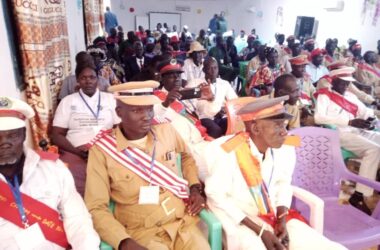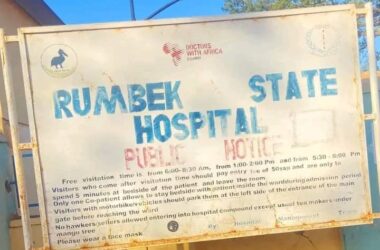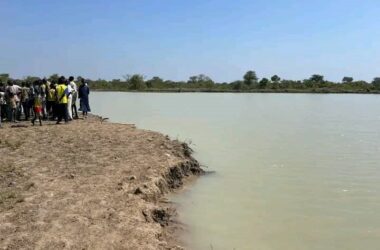By William Madouk
For generations, the women of Wulu County in Lakes State have relied on a simple Shea nut tree, known locally as “Lulu,” to sustain their livelihoods.
Traditionally, the process of extracting oil from the nuts was a labor-intensive affair, involving manual collection, roasting, pounding, and sieving.
However, a partnership between Oxfam South Sudan and the German Federal Ministry for Economic Cooperation and Development with funding from Bundesministerium für Wirtschaftliche Zusammenarbeit und Entwicklung (BMZ) has transformed this traditional practice.
Under the project dubbed “Building Resilience through Agriculture and Livelihood”, the women are now equipped with tools and techniques, modernizing the Shea oil production.
With improved methods, the women of Wulu are now able to produce higher quality and quantities of Shea oil. This increased production has not only empowered the women financially but has also opened up new markets for their products.
Mary Hayat, chair lady of the Mitorodo Women’s Shea Butter Group, narrated how they have been traditionally reaping the benefits of Shea nut trees to sustain their lives.
“We go and collect the Shea-nuts, spread it in the sunlight, roast it and pound or grind it with stones, place it in the water and after it dries up, we finally sieve oil,” Hayat narrated how they struggled to make Lulu oil.
She added that if the nuts did not dry up well – which normally takes 3-4 days then the quantity of the oil is the least.
But after acquiring skills to use a processing machine and obtaining an oil processing machine, their work has become much easier, reducing delays and boosting production.
“Oxfam in South Sudan took us for training and donated oil processing machine,” she added. “We have an increase in Lulu oil production.”

Shea butter trees grow very slowly; they begin to bear fruit after 15 to 20 years and continue to do so for the rest of their lifespan.
With the density of Shea butter trees in Domoloto payam of Wulu County, a plant that mostly grows alone as a gift from God – it becomes a better place for local farmers to sieve oil and earn a fortune.
The Mitorodo chairlady states that they sell one litre of Shea oil for 10,000 South Sudan Pounds. This means that 20 or 25 litres could fetch 200,000 to 250,000 South Sudan Pounds or even more, depending on the quantity.
“Sometimes, it helps us in paying medical bills; if a family member falls sick, this money can assist in clearing their medical bills and also for paying the school fees for our children,” Hayat explained.
Currently, about 35 people both males and females are accommodated in the processing group as per the organization’s advice to assimilate into the group for better management and outcome. The members do not bring in capital, but their ability, skills and production capacity.
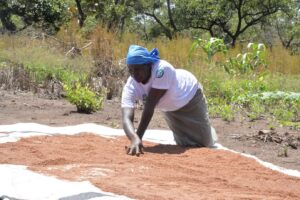
“We were happy when they supported us with Rakshaw (tricycle) [to transport goods] this has helped us to prosper in our business. If Oxfam did not donate us with Rakshaw, I believe our initiative won’t prosper,” she says.
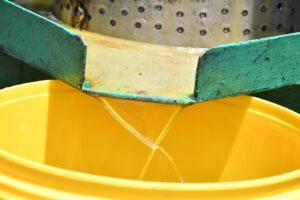
“During the rainy season, people drink from streams. However, it worsens during the dry season when streams dry up, no nearby borehole and the nearby water point takes 3 hours to walk,” she says.
“The work we are doing also requires water, if you bring water after many hours – it ends up for drinking and nothing else you can do,” Hayat added.
Mrs Hayat called on the government and donors to dig boreholes so that the community could quench their thirst. She also hinted a support for the construction of store storehouse for better stowing.
She vowed “we will not stop but continue with the current project, we are taught the way how to live and earn decent money.”

“The third project is BMZ, which is a Germany-funded project with integrated projects of food security, DRR, governance and WASH,” he said.
He called on the community and the government to take ownership and ensure its sustainability.
“If they take full ownership the projects will continue to exist and that will be happiness,” Majok added.
He appealed to the donors to continue their support, adding that ‘a lot needs to be done in South Sudan’ because the nation is not at the reconstruction stage but ‘completely at zero stage.’
“As Oxfam in South Sudan what we intend to do; is to disengage or eliminate the mentality of relief, we need to train these communities to work for themselves and that is more sustainable,” he stressed.
“We are happy as Oxfam in South Sudan because all the projects we are been doing impacted a lot of the people we have supported.”
He added that “the testimonies come direct from the communities so that is one thing that motive us to do more and provide more need because we have not reached most of the areas, maybe what we have done is 40%.”
Wulu County is located in Lakes State and is the largest county in Lakes. It borders Cueibet County to the north, Rumbek Centre and Rumbek East Counties to the north-east, Yirol West County to the east.
It also borders Warrap State (Tonj South County) to the north-west and Western Equatoria State to the west, south and southeast. The Gulnam and Roah rivers flow through the county.
The people of Wulu County, Lakes State predominantly practice agriculture and fishing, with many households also supplement their livelihoods by raising animals (such as goats, sheep and poultry).
While the Belle and Bongo are the majority within the county, they are minorities within Lakes States. An estimated 80% of households engaged in agriculture in Wulu County in 2018 (FAO/WFP 2018).


